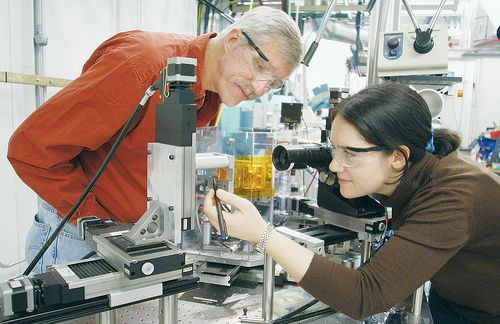How An Alzheimer’s Drug Trial Failure Might Have Given Scientists Something Almost As Good In the Process

Scientists tend to put a muzzle over their failed studies — the ones that yielded unimpressive, if downright meaningless, results. Months or years of effort, involving thousands of patients, may produce zero insight. But that isn’t the case of a recent drug trial, which sought to improve cognitive function in Alzheimer’s patients. While researchers didn’t hit their target, flying way off course may have put them on track for even greater breakthroughs.
Alzheimer’s disease currently affects more than five million Americans, according to the Alzheimer’s Association. Researchers have yet to find a cure for the neurological disease, though the strongest theory for its appearance is an overabundance of misfolded proteins in the brain, called beta amyloid plaques. These can lead to so-called “tangles” of a protein called tau, both of which disrupt neural communication and degrade cognitive function. For years, scientists have tried to develop ways to catch the disease early and stop its progression. The present study may have failed in both attempts, but the team believes understanding where it went wrong could prove even more valuable.
The research team from Brown University initially revealed the disappointing results in 2012. They conducted two related trials. The first involved 1,121 carriers of a gene allele known as APOE, which has been linked to a greater risk for developing Alzheimer's. The other study recruited 1,331 subjects who didn’t carry the allele. Each participant was between the ages of 50 and 88 years old and scored as a “probable” Alzheimer’s sufferer. Half of all subjects received the antibody drug bapineuzumab — "bapi" — which binds to and triggers the clearance of beta amyloid.
After 78 weeks of treatment, with evaluation every 13 weeks, the team found no discernable difference between the groups that had been receiving the drug and those that hadn’t. Cognitive function declined unabated, and the subjects fell deeper into their dementia. The only upsides were the decreases in tau protein in the spinal fluid of some subjects.
"It is very disappointing, especially to the terrific and dedicated patients and their families," said Stephen Salloway, lead author and professor of neurology and psychiatry in the Warren Alpert Medical School of Brown University, in a statement. "So much effort went into this trial. Alzheimer's is a difficult and complex disease, and we are moving forward."
Despite their inability to slow the disease, Salloway and his team believe they may have uncovered equally important information. They learned, for instance, that patients should receive the drug before the amyloid plaques have already begun to do damage, and that researchers should establish a safe dosage and assign bapi only to patients with amyloid plaque build-up.
With this knowledge still come numerous challenges, Salloway remarked. Drug companies seldom collaborate with one another to develop tailored treatment options, for fear they reduce their value as an innovator. "Without taking strategic risks, we aren't going to make the progress we need to move forward," he said.
Salloway’s team also has plans to narrow the pool of its participants, as they believe many of the participants suffered from non-Alzheimer’s forms of dementia. These other diseases may have responded differently to the drugs than amyloid plaques alone would have. Teasing out these relevant details could offer more general knowledge into the way Alzheimer’s patients respond to targeted drug therapies.
"The biggest disappointment from this trial, was that if we had shown benefit with a drug like bapi, it would give people hope that Alzheimer's is a treatable disease, that we can slow it down," Salloway said. "For the level of suffering with this disease and for our economy, we have to break down barriers and come up with innovative approaches."
Source: Salloway S, Sperling R, Fox N. Two Phase 3 Trials of Bapineuzumab in Mild-to-Moderate Alzheimer's Disease. NEJM. 2014.
Published by Medicaldaily.com



























